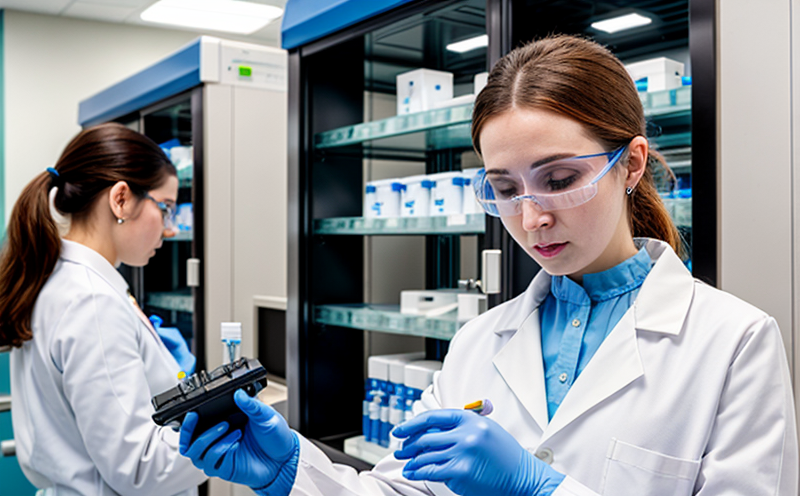qPCR Quantitative Polymerase Chain Reaction Testing
The quantitative polymerase chain reaction (qPCR) is a fundamental molecular biology technique widely used in pharmaceutical testing. This method allows for precise quantification of target DNA sequences, making it invaluable for bioanalytical applications such as drug development and quality assurance.
At its core, qPCR involves amplifying specific segments of DNA through cycles of denaturation, annealing, and extension using Taq polymerase enzyme in the presence of fluorescent markers. The amount of target sequence present can be quantified by monitoring the accumulation of these fluorescent signals over time during the amplification process. This capability makes qPCR a robust tool for detecting minute quantities of nucleic acids with high sensitivity.
In pharmaceutical testing, qPCR plays a crucial role in several key areas:
- Quantifying active pharmaceutical ingredients (APIs) to ensure compliance with dosage levels and purity standards.
- Detecting genetic modifications or mutations within the DNA sequence of APIs to assess their safety profile.
- Monitoring impurities and degradation products in drug formulations, which is essential for maintaining product quality.
- Identifying potential contaminants during manufacturing processes to safeguard against cross-contamination issues.
The accuracy and reliability of qPCR depend heavily on stringent laboratory practices and high-quality reagents. At our facility, we adhere strictly to internationally recognized standards such as ISO 17025 for method validation and proficiency testing. Our experienced technicians perform meticulous sample preparation, ensuring that each assay begins with a clean and consistent starting material.
Our state-of-the-art qPCR equipment supports various amplification platforms including real-time PCR systems from leading manufacturers like ABI (Thermo Fisher Scientific), Roche LightCycler, and Bio-Rad CFX96. These instruments offer robust performance characteristics along with user-friendly interfaces that facilitate efficient operation even by less experienced users.
The output of our qPCR tests includes detailed reports specifying the concentration or presence/absence of target sequences as well as any relevant amplification curves generated throughout the reaction. Compliance officers will find this information particularly useful when verifying adherence to regulatory requirements set forth by organizations like FDA, EMA, and WHO.
Scope and Methodology
The scope of our qPCR testing extends beyond simple detection; it encompasses comprehensive analysis tailored specifically for pharmaceutical applications. Here’s an overview:
- Sample Preparation: Rigorous protocols ensure that samples are prepared correctly before being subjected to the amplification process.
- Primers and Probes: Custom-designed primers and probes specific to the target sequences guarantee accurate detection and quantification.
- Amplification Protocol: Optimized cycling conditions maximize specificity while minimizing non-specific amplifications.
- Data Analysis: Advanced software tools process raw data, providing precise quantification results along with quality metrics indicative of assay performance.
To ensure consistent and reproducible results, we follow stringent method validation procedures based on international standards like ISO 17025. This includes establishing appropriate detection limits, linearity ranges, and matrix effects that may influence final measurements.
Our team continuously evaluates new technologies and methodologies to stay at the forefront of scientific advancement in pharmaceutical testing. By integrating these cutting-edge approaches into our services, we provide clients with reliable data they can trust when making critical decisions about their drug candidates or finished products.
Competitive Advantage and Market Impact
Our commitment to excellence in qPCR testing positions us as leaders within the pharmaceutical industry. Here are some reasons why:
- Comprehensive Services: Offering a full range of bioanalytical services, from initial screening through final verification.
- Regulatory Compliance: Ensuring all our procedures meet or exceed global regulatory standards to support successful submissions for approval.
- Expertise and Experience: Leveraging years of experience in molecular biology research and development.
- Innovation: Regularly incorporating novel techniques and technologies into our practice to enhance service offerings.
The impact of our services is felt across various sectors within the pharmaceutical industry, including biopharmaceuticals, generics manufacturers, contract research organizations (CROs), and academic institutions. By providing accurate, reliable data promptly, we contribute significantly towards accelerating drug discovery processes while ensuring patient safety throughout clinical trials and post-marketing surveillance.
Use Cases and Application Examples
- Detection of Residual DNA in APIs: Ensuring the absence or minimal presence of unwanted genetic material is critical for preventing adverse reactions.
- Mutation Analysis: Identifying single nucleotide polymorphisms (SNPs) or other variants that could affect drug efficacy and safety.
- Purity Checks: Verifying that APIs contain only the specified active components without contamination by impurities or degradation products.
- Development of Quality Control Protocols: Establishing baseline values for expected levels of constituents to monitor during production runs.
- Process Validation: Confirming that manufacturing procedures do not introduce unintended changes into the chemical structure of APIs.
- Adverse Event Investigations: Investigating suspected cases where contaminants might have contributed to adverse outcomes in patients.
These applications demonstrate how integral qPCR is to ensuring high-quality pharmaceutical products. From early stage R&D through final product release, our services play a vital role in maintaining the integrity and safety of drugs reaching markets worldwide.





